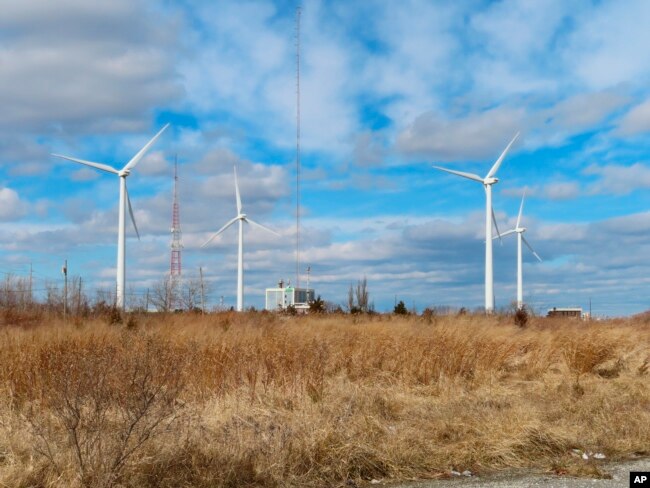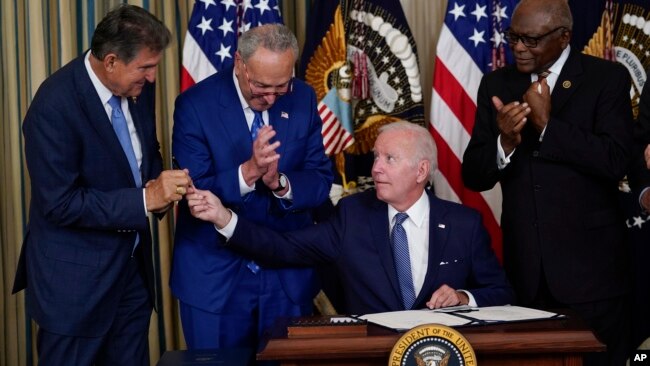米国の気候変動に関する新法
トランプの暗黒世界が終了し、やっとまともになったアメリカ、遅きに失した感ありですが・・・
問われる資本主義。いつまで成長を追い求めるのか。社会主義の分配を成すために国の管理はどこまで許容されるのか。長期目標を設定できない民主義国家の弱さはどのように克服できるのか。
目指せスェーデン!!個人所得は伸びながら、脱炭素社会を実現しているのです。
レーン・メイドナー モデル、これこそ日本に導入したい考え方ですが、許されないのでしょうか。産業構造転換が不可欠です。
今日のVOA、いろいろ考えさせられる記事でした。
VOAで英語を学びましょう!!
科学者たち: 米国の気候法は温暖化を抑制する可能性が高い(和訳)
Scientists: US Climate Law Likely to Reduce Warming
August 18, 2022
アメリカのジョー・バイデン大統領は、気候変動と医療に関する大規模な法案に署名しました。新法は、今後10年間のクリーンエネルギーへの取り組みを支援するための3750億ドルの支出を含んでいます。
この支出は、最初に提案されたものよりはるかに少ないものです。しかし、バイデン氏と民主党の議員たちは、この法律が "米国史上、by far圧倒的に大きな気候変動への投資となるだろう "と述べました。彼らは、この投資によって、2030年までに温室効果ガスの排出を40%削減する道に進むだろうと述べています。
法律の中身は?
一部のアメリカ人にとっては、中古の電気自動車を購入する場合は4,000ドル、新車の場合は最大7,500ドルの税額控除が受けられるということです。この税額控除は、米国で製造された電気自動車、または米国で製造された部品を搭載した電気自動車に適用されます。また、風力や太陽光などの再生可能エネルギー投資に対するtax breaks減税もあります。
企業向けには、クリーンエネルギー製造tax credit税額控除に600億ドル、風力と太陽光の生産tax credit税額控除に300億ドルが盛り込まれています。これは、国が化石燃料から脱却するのに役立つ産業を支援するためのものです。
また、石油会社が数百万ドルを投じて開発したnuclear power原子力発電やcarbon capture technology炭素回収技術にもtax credits税額控除を行います。連邦の土地や水域での石油やガスの探査をより多く許可する一方で、石油やガスの掘削による過剰なメタン排出に新たな手数料を設定することになります。
アリゾナ、ネバダ、コロラドを含む西部の各州は、極度の乾燥気象への対処とコロラド川の保護活動のために40億ドルを受け取ることになります。約4000万人のアメリカ人が、飲料水をこの川に依存しています。
気候科学者の調査
Climate Action Trackerという団体は、パリ気候協定に対する政府の気候変動対策を測定しています。それによると、世界があと さらにコンマ数度の温暖化にとどまるために、米国はまだ十分なことをしていないと言います。新たな支出は”不十分”であると評価しています。
ビル・ヘアー氏は、このトラッカーを発行しているクライメート・アナリティックスのディレクターです。「これは、気候政策に関して米国に起こった最大の出来事ですと、彼は言います「過去数十年を振り返ってみると、失礼かもしれませんが、口先ばかりで行動が伴わないことが多かったですね。」
これは行動なのです、と彼は言います。ヨーロッパほどではないが、アメリカ人は今でも一人当たりヨーロッパ人の2倍もの熱を奪うガスを放出している、とヘアー氏は付け加えています。
アメリカはまた、他のどの国よりも多くの熱を奪うガスを大気中に放出しています。
米国の気候変動対策法が施行される前、Climate Action Trackerは、産業革命以前と比べて世界が3〜4度温暖化すると計算していました。もし米国の行動を他の国々が追ったとしても、2〜3℃の温暖化にしかつながらないでしょう。
それでも、産業革命前からの気温上昇を1.5℃に抑えるという国際目標には及びません。そして、世界は19世紀半ばからすでに1.1度温暖化しているのです。
ヘアー氏は、チリと、名前は伏せたが東南アジアの数カ国の当局者は、この夏、独自の "政策と目標 "を設定する前に米国を待っているところだと話したと言います。
そして中国は、ヘアー氏の言葉で言えば ”大きな声では言わないが、私が思うに彼らは米国の動きを自分たちも合わせる必要があると考えるだろう。」
Climate Action Trackerの科学者たちは、他に新しい気候政策がなければ、2030年の米国の二酸化炭素排出量は2005年比で26~42%まで縮小すると計算しています。
他の研究者や科学者も、Climate Action Trackerの試算に同意しています。
「米国が排出する温室効果ガスは膨大な量です。」と、プリンストン大学の気候科学者ガブリエル・ベッキ氏は言います。「だから、それを減らすことは間違いなく世界に影響を与えるでしょう。」
サマンサ・グロス氏は、ブルッキングス研究所の気候・エネルギー担当ディレクターです。彼女はこの新しい法律を、米国の排出量削減のための頭金と呼んでいます。
「この法律ができたので、米国は少しお祝いをして、それから実施と次に起こるべきことに集中することができます。」とグロス氏は言っています。
Scientists: US Climate Law Likely to Reduce Warming
American President Joe Biden has signed into law a major bill on climate change and healthcare. The new law includes $375 billion in spending to help clean energy efforts over the next 10 years.
The spending is much smaller than first proposed. But Biden and his Democratic Party lawmakers said the law “would represent the single biggest climate investment in U.S. history, by far.” They said the investment would put the country on a path to cut greenhouse gas emissions by 40 percent by 2030.
What’s in the law?
For some Americans, that means a tax credit of $4,000 to buy a used electric vehicle and up to $7,500 for a new one. The credit is good for electric vehicles that are manufactured in the U.S. or have parts made in the country. There are also tax breaks for renewable energy investments in wind and solar.
For businesses, the law includes $60 billion for a clean energy manufacturing tax credit and $30 billion for a production tax credit for wind and solar. It is designed to support the industries that help the country move away from fossil fuels.
The law also gives tax credits for nuclear power and carbon capture technology that oil companies have invested millions of dollars to develop. It would set a new fee on excess methane emissions from oil and gas drilling while permitting more exploration for oil and gas on federal lands and waters.
Western states including Arizona, Nevada and Colorado would receive $4 billion to deal with extremely dry weather conditions and conservation efforts in the Colorado River. Nearly 40 million Americans depend on the river for drinking water.
Climate scientists’ study
The group Climate Action Tracker measures government climate action against the Paris climate agreement. It says the United States still is not doing enough to help the world stay within another few tenths of a degree of warming. It rates the new spending as “insufficient.”
Bill Hare is the director of Climate Analytics which puts out the tracker. “This is the biggest thing to happen to the U.S. on climate policy,” he said. “When you think back over the last decades, you know, not wanting to be impolite, there’s a lot of talk, but not much action.”
This is action, he said. Not as much as Europe, and Americans still release two times as much heat-trapping gases per person as Europeans, Hare added.
The U.S. has also released more heat-trapping gas into the air than any other nation.
Before the U.S. climate law, Climate Action Tracker calculated that the world would warm up 3 to 4 degrees Celsius above pre-industrial times. The U.S. actions, if followed by other countries, would lead to only 2 to 3 degrees Celsius of warming.
That would still fall short of the international goal of limiting warming to 1.5 degrees Celsius since pre-industrial times. And the world has already warmed 1.1 degrees Celsius since the mid-19th century.
Hare said officials from Chile and a few Southeast Asian countries, which he would not name, told him this summer that they were waiting for the U.S. before setting their own “policies and targets.”
And China, in Hare’s words, “won’t say this out loud, but I think [they] will see the U.S. move as something they need to match.”
Scientists at the Climate Action Tracker calculated that without any other new climate policies, U.S. carbon dioxide emissions in 2030 will shrink to 26 to 42 percent below 2005 levels.
Other researchers and scientists agreed with the Climate Action Tracker estimates.
“The contributions from the U.S. to greenhouse gas emissions are huge,” said Princeton University climate scientist Gabriel Vecchi. “So reducing that is definitely going to have a global impact.”
Samantha Gross is the director of climate and energy at the Brookings Institution. She called the new law a down payment on U.S. emission reductions.
“Now that this is done, the U.S. can celebrate a little, then focus on implementation and what needs to happen next,” Gross said.
Words in This Story
greenhouse gas - n. gas that cause the warming of the earth's atmosphere
emission - n. the act of producing or sending energy or gas
excess - adj. more than usual
insufficient - adj. not having enough of what is needed
calculate - v. to find a number by using mathematical process
decade - n. a ten-year period
match - v. to do something that is equal
contribution - n. something that is done to cause something to happen
impact - n. major or powerful influence or effect
focus - v. to direct attention to something
implementation - n. act of making something active or effective


